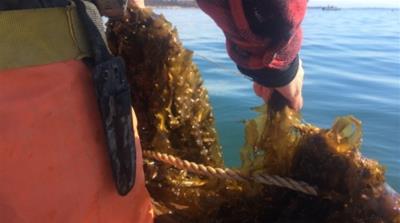2018 Farm Bill Updates
Moreover, the bill, introduced by HAC Chairman, Mike Conaway (R-TX), expanded the list of people who are eligible for crop and conservation payments to include people who operate Concentrated Animal Feeding Operations (CAFO). Do you think that industrialized meat production counts as environmental conservation??? All democrats voted against the bill, and all Republicans for the bill.

“The impacts of industrial agriculture on the environment, public health, and rural communities make it an unsustainable way to grow our food over the long term. And better, science-based methods are available.” Please visit and consider donating to Union of Concerned Scientist for more information.
Future of Fish Founder, Bren Smith, Makes Waves on Long Island with His 3D Vertical Farms
Seaweeds have been cultivated and harvested as food for decades; most basically, we have used natural patches which grow in estuaries and other shallow, brackish waters. Originally developed in Japan, the Philippines, and other places around the globe, farming seaweed has become increasingly popular, especially here in the US. It has proven to be a successful practice (and industry) which “improves economic conditions, reduces fishing pressure and over-exploited fisheries, and mitigates the effects of climate change.” Not only is eating seaweed alone delicious, but it is a popular export commodity for the production of agar and carrageenan–both of which are used widely in the food industry as a thickener, stabilizer, and substitute for gelatin. (Carrageenan has been in the news quite a bit of late, because studies have shown it to be carcinogenic, and the Organic Standards Board has recommended it be removed from the list of approved organic ingredients. But big food lobbyists pushed hard, and it has not been removed.)
Long Island’s own, Future of Fish founder, Bren Smith, is also aiming to transform food production with his 3D vertical farms. “Requiring zero inputs, [a polyculture vertical farming system beneath the water’s surface which grows a mix of seaweed and shellfish] is the most sustainable form of food production on the planet, and it also sequesters carbon and rebuilds reef ecosystems. The crops can be used as food, fertilizer, animal feed and even energy.” Read more from Aljazeera here: http://aje.io/5tye9
Some environmental groups still have reservations concerning this trending solutions, such as whether these proposed methods are likely to degrade local and regional ecosystems.
Is it likely that kelp will replace other native seaweeds like eel grass? Are there places around L.I. where kelp grows naturally? Are the species of kelp being used for farming the same as the species that grow in our area naturally?
 |
| Scientists, fisherman and farmers have found that kelp reduces water acidification rate. It pulls so much carbon and nitrogen out of the water, that it actually changes the water quality. [Alice Martineau/Al Jazeera] |

Comments are closed.